模块6 Unit 1 Laughter is good for you Grammar and usage(1)宾语补足语课件(37张PPT)
文档属性
| 名称 | 模块6 Unit 1 Laughter is good for you Grammar and usage(1)宾语补足语课件(37张PPT) | 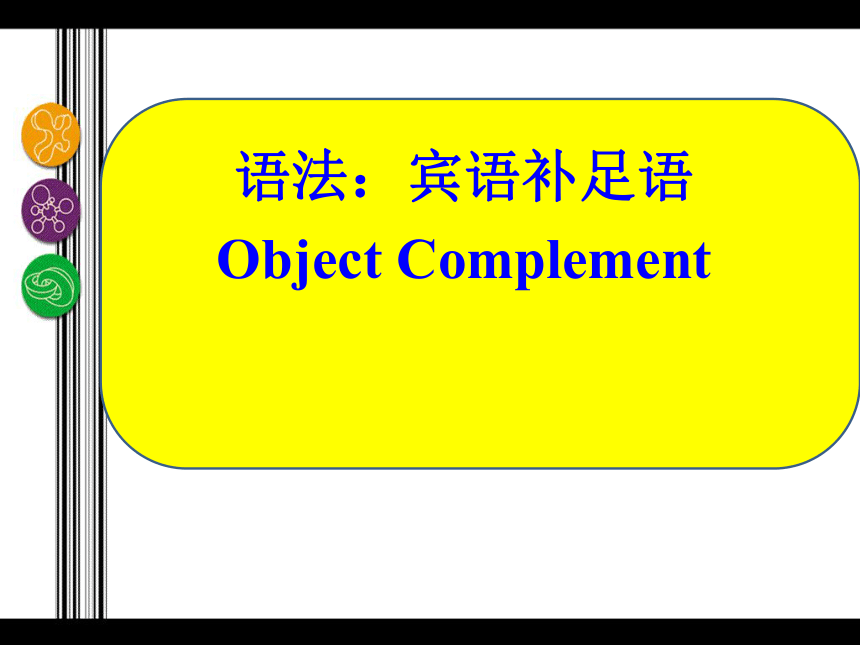 | |
| 格式 | zip | ||
| 文件大小 | 3.2MB | ||
| 资源类型 | 教案 | ||
| 版本资源 | 牛津译林版 | ||
| 科目 | 英语 | ||
| 更新时间 | 2020-02-27 16:32:32 | ||
图片预览

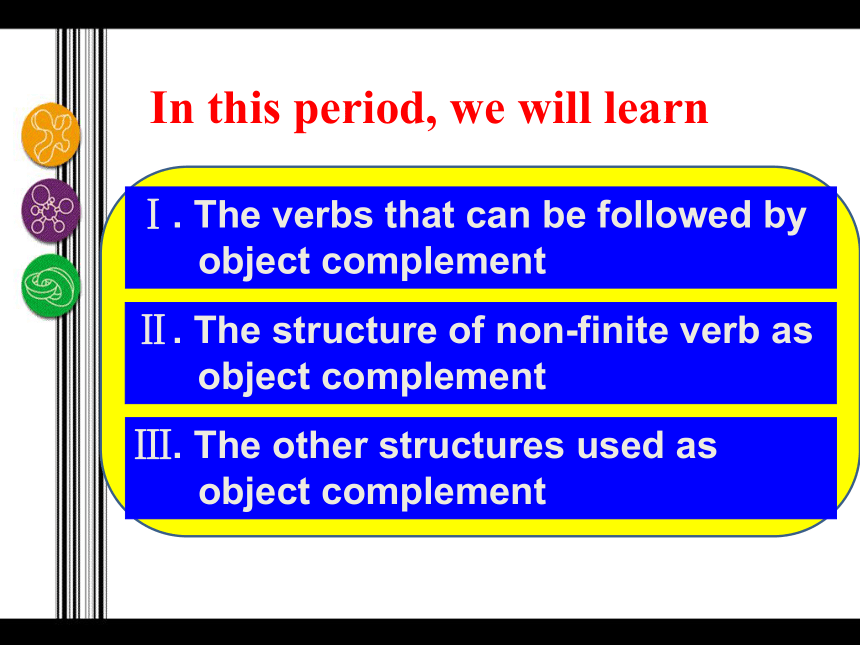
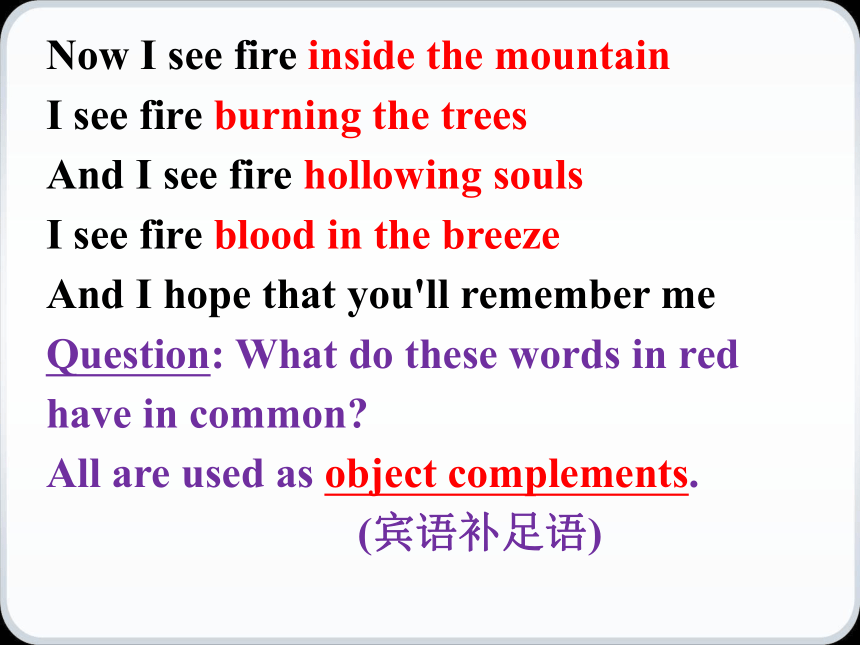
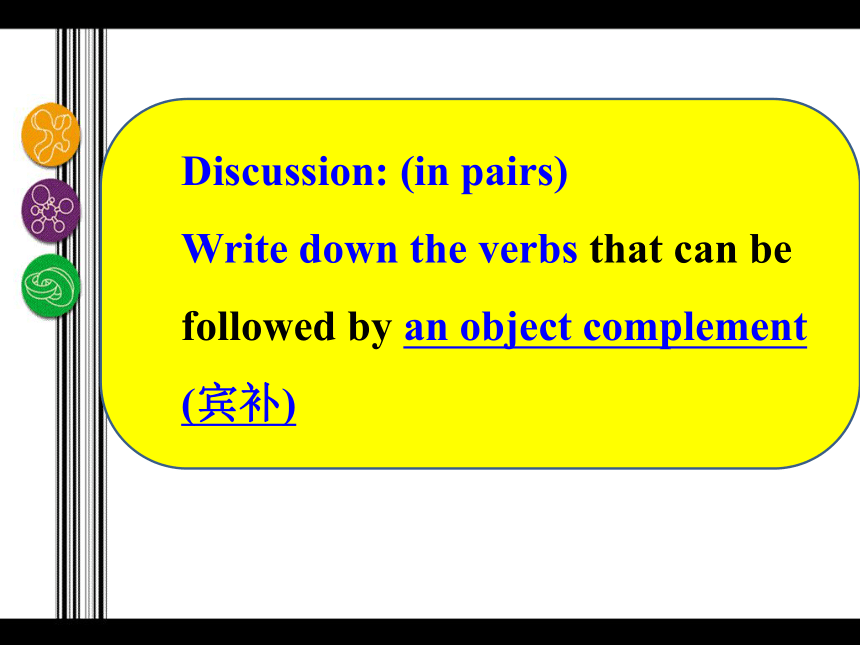
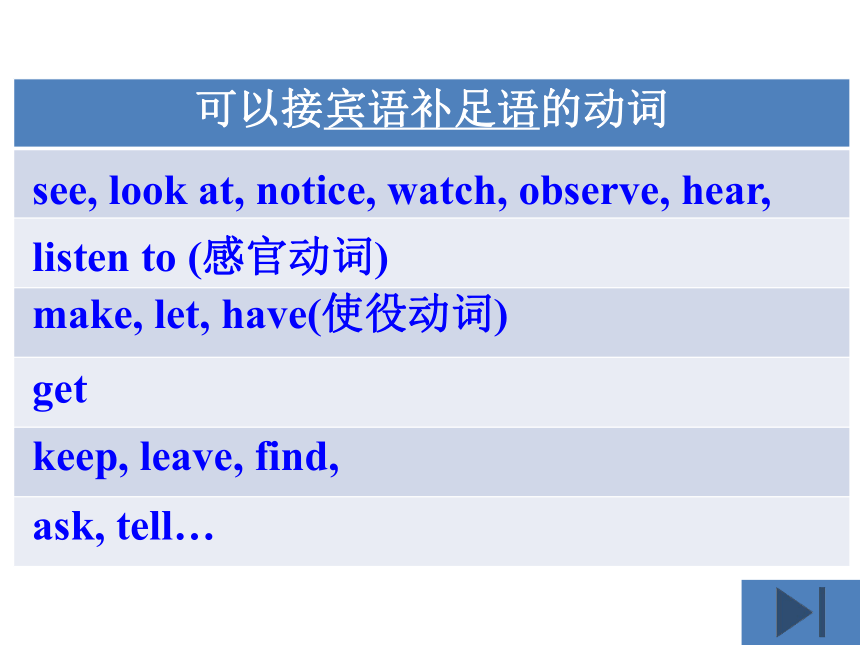
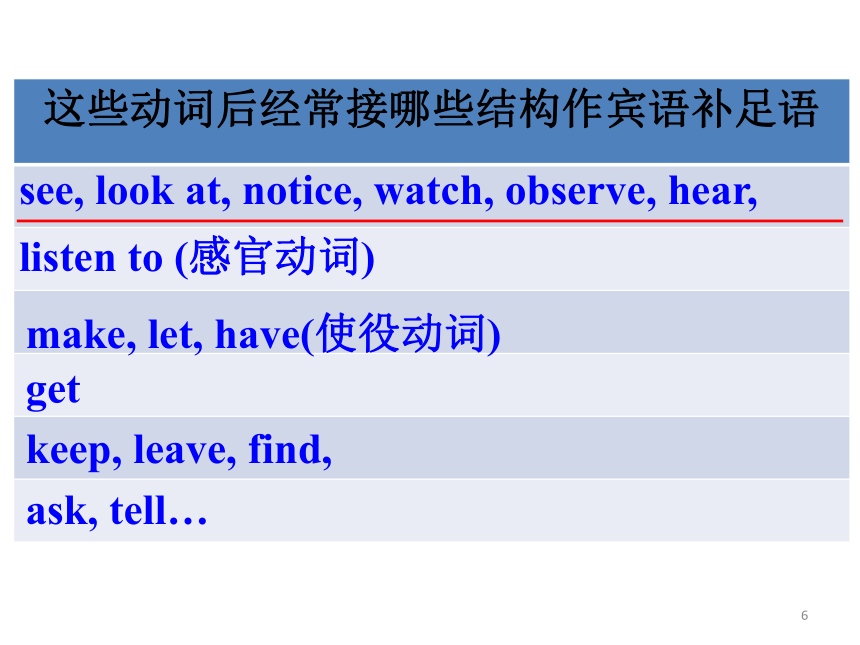
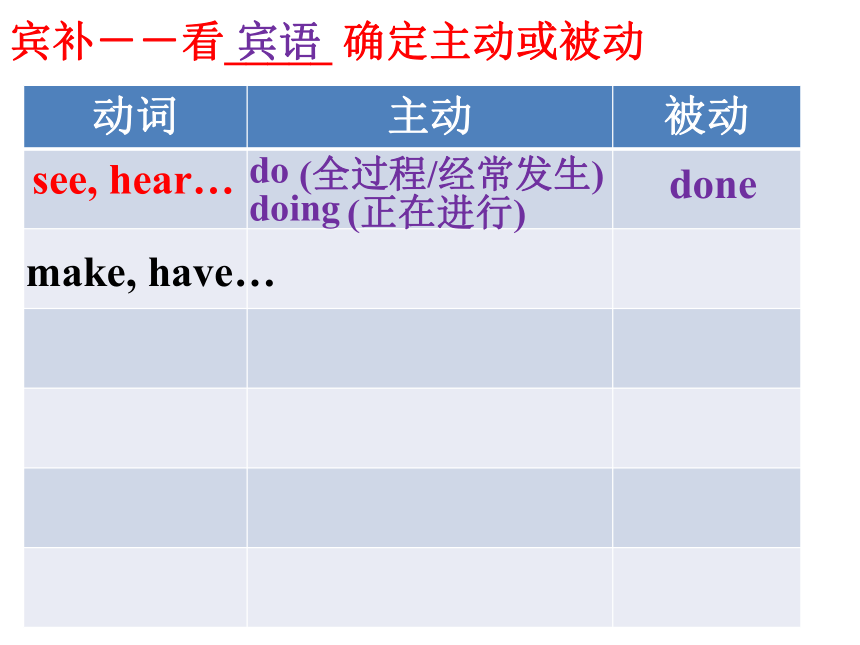
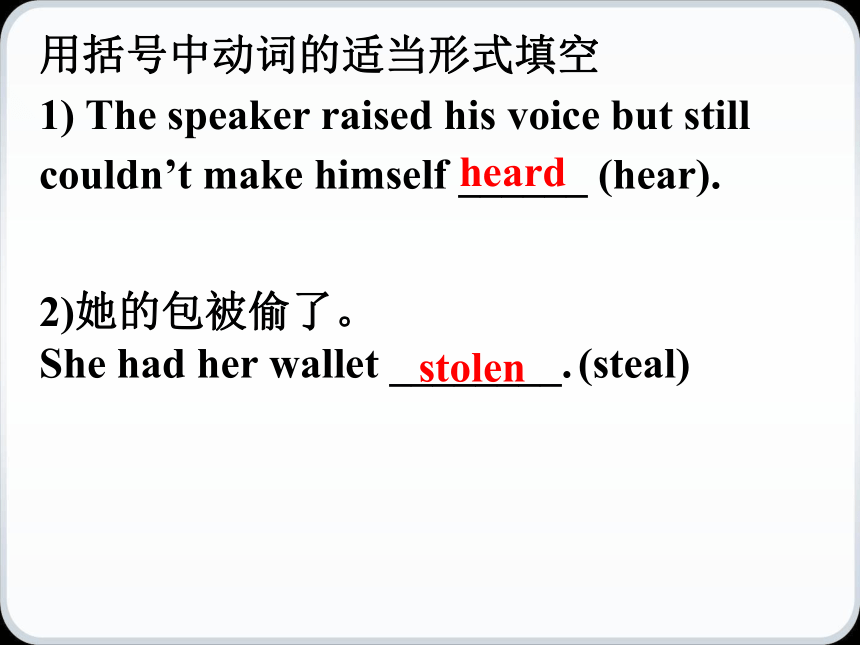

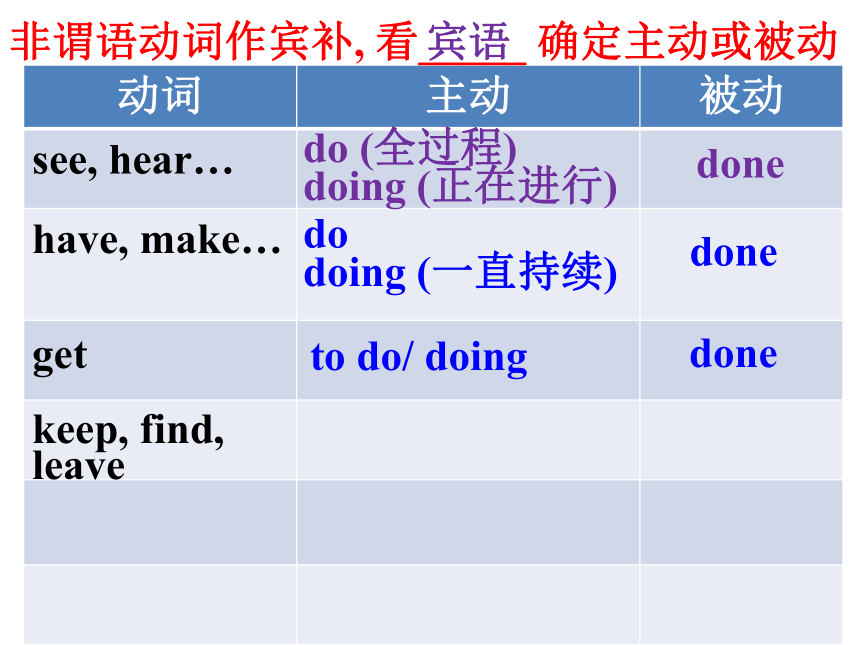
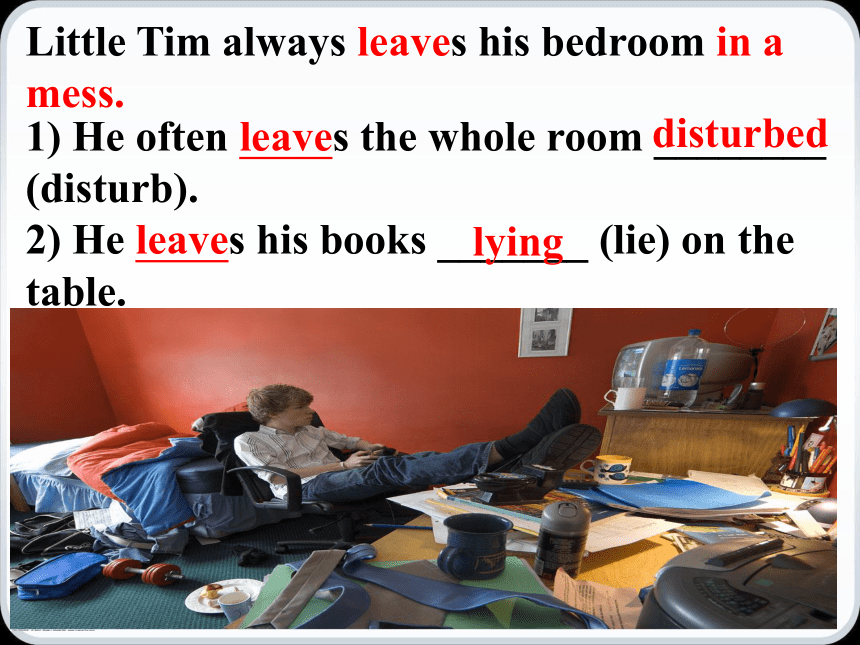
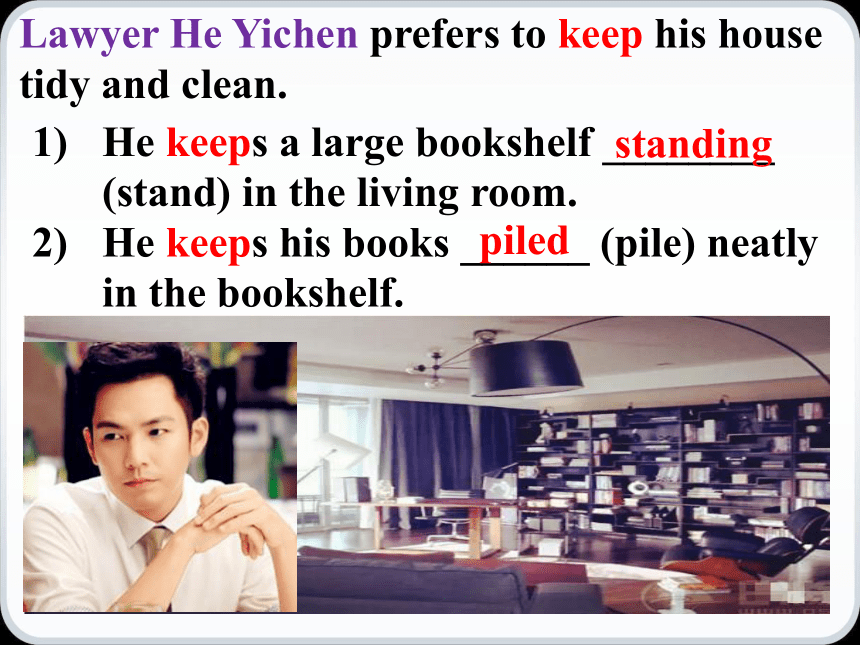
文档简介
(共37张PPT)
语法:宾语补足语
Object Complement
In this period, we will learn
Ⅰ. The verbs that can be followed by object complement
Ⅱ. The structure of non-finite verb as object complement
Ⅲ. The other structures used as object complement
Now I see fire inside the mountain I see fire burning the trees And I see fire hollowing souls I see fire blood in the breeze And I hope that you'll remember me
Question: What do these words in red have in common?
All are used as object complements.
(宾语补足语)
Discussion: (in pairs)
Write down the verbs that can be followed by an object complement (宾补)
see, look at, notice, watch, observe, hear, listen to (感官动词)
make, let, have(使役动词)
get
keep, leave, find,
ask, tell…
可以接宾语补足语的动词
*
see, look at, notice, watch, observe, hear, listen to (感官动词)
make, let, have(使役动词)
get
keep, leave, find,
ask, tell…
这些动词后经常接哪些结构作宾语补足语
宾补--看_____ 确定主动或被动
宾语
do
doing
done
(全过程/经常发生)
(正在进行)
make, have…
动词 主动 被动
see, hear…
用括号中动词的适当形式填空
1) The speaker raised his voice but still couldn’t make himself ______ (hear).
2)她的包被偷了。
She had her wallet ________. (steal)
heard
stolen
非谓语动词作宾补, 看_____ 确定主动或被动
宾语
do (全过程)
doing (正在进行)
done
have, make…
do
doing
done
(一直持续)
get
动词 主动 被动
see, hear…
非谓语动词作宾补, 看_____ 确定主动或被动
宾语
do (全过程)
doing (正在进行)
done
do
doing (一直持续)
done
to do/ doing
done
get
keep, find, leave
动词 主动 被动
see, hear…
have, make…
Little Tim always leaves his bedroom in a mess.
1) He often leaves the whole room ________ (disturb).
2) He leaves his books _______ (lie) on the table.
disturbed
lying
Lawyer He Yichen prefers to keep his house tidy and clean.
He keeps a large bookshelf ________ (stand) in the living room.
He keeps his books ______ (pile) neatly in the bookshelf.
standing
piled
Walking on the street, I found a baby ______ (sit) in a basket and ________ (laugh) happily.
I was amazed to find a baby _____ (put) in a basket by his father.
sitting
laughing
put
非谓语动词作宾补, 看_____ 确定主动或被动
宾语
do (全过程)
doing (正在进行)
done
have, make…
do
doing (一直持续)
done
keep, find, leave
to do/ doing
done
get
doing
done
ask, tell…
to do
to be done
动词 主动 被动
see, hear…
Discussion: (in groups)
Write down the verbs that should be followed by “to do” as an object complement (宾补).
ask, tell, …sb to do sth
想要某人做某事
允许/ 禁止某人做某事
教/ 指导/ 鼓励/ 激励某人做某事
建议/要求/ 命令某人做某事
说服/ 邀请某人做某事
相信/ 认为某人是…
want, wish, expect sb to do
allow, permit, forbid sb to do
teach, instruct, encourage, inspire sb to do
advise, require, order sb to do
persuade, invite sb to do
believe, consider, think, suppose sb to be
后接不定式作宾语补足语的动词:
Besides non-finite verbs (非谓语动词), what other structures can be used as object complements (宾补)?
They paint the wall _______.
blue
形容词作宾补
Amy is crazy about ‘hello kitty’.
I find two ‘hello kitty’ mats ___________.
I find some ‘hello kitty’ food ___________.
on the floor
on the plates
介词短语作宾补
Look into my eyes, you will see what you mean to me; Search your heart, search your soul and when you'll find me _____ you'll search no more.
there
副词(不以-ly结尾的)作宾补
Besides ‘there’, what other adverbs (副词) can be used as object complements (宾补)?
here, in, out, on, off, away, inside, outside, up, down, upstairs, downstairs …
有些动词后可接名词作宾补:
a kind child
call, name, elect, make, think, choose, find, consider, keep, feel
1) We consider him __ ____ ____. (是一个好心的孩子)
2) I feel it __ ____ _____ (觉得这是极大的荣幸) to give the speech.
a great honour
*
宾补?
形容词
介词短语
不以ly结尾的副词
非谓语动词
名词
1) The boy pretends to be conducting music confidently, with the girl _______ (look) at him in great surprise.
looking
2) The baby is sleeping soundly, with his head _________ (support) by his father’s hand.
supported
3) With a lot of homework _____ (do), the boy stays up late every night.
to do
1) 宾语和宾补是主动的关系,则用______;
2) 宾语和宾补是被动的关系,则用______;
3) 表将来要完成的动作,则用_______ (此结构用主动表被动)
4) adj./adv./介词短语表_______
doing
done
to do
doing
done
to do
with +宾语+
adj./adv./介词短语
状态
The lovely baby is laughing,
with his mouth and eyes ________
with a towel _______________
with his head _________________
wide open
over/on his head
covering his head
covered by a towel
The cute baby is smiling,
with his mouth ______
with his chin _____________
with his fingers ________ (cross)
open
on/ against his hand
crossed
The baby is crying,
with tears _______ (come) down.
with tears ___ his face.
with his mom _________
coming
on
lost/ missing/ disappearing
Where is my mom?
The lovely baby is sleeping,
手支撑着头 with his hands _______________
嘴巴凸起 with his mouth ______________
什么也没穿 __________________________
supporting his head
raised
with nothing on
Fill in the blanks:
Walking in the bush, she felt her leg ______ (bite), and then fell.
I happened to see him _______ (drive) at a very high speed through the street.
bitten
driving
1) I fell down and broke three teeth. I wonder how many times I have to come here and get my false teeth ___.
A. fix B. fixing
C. fixed D. to fix
2) --- Why did you go back to the shop?
--- I left my friend ___ there.
A. wait B. to wait
C. waits D. waiting
Make a sentence, using ‘with sth to do’, according to the picture and the dialogue.
Mom:
Peter:
Darling, why don’t you fall asleep? You look worried. What’s the matter?
I have an English exam tomorrow.
With an English exam to worry about, poor Peter had difficulty falling asleep.
Watch and fill in the blanks, using different O.C. (宾补).
1) In order to be a real ‘greedy eater (吃货)’, we are supposed to keep the plate ______.
2) If the judge finds you _______ food on the plate, you will lose the game.
clean
leaving
*
Summary: the important points in this period.
The words that can be followed by an object complement.
The structures that can be used as an object complement.
With 的复合结构
Thanks for listening!
语法:宾语补足语
Object Complement
In this period, we will learn
Ⅰ. The verbs that can be followed by object complement
Ⅱ. The structure of non-finite verb as object complement
Ⅲ. The other structures used as object complement
Now I see fire inside the mountain I see fire burning the trees And I see fire hollowing souls I see fire blood in the breeze And I hope that you'll remember me
Question: What do these words in red have in common?
All are used as object complements.
(宾语补足语)
Discussion: (in pairs)
Write down the verbs that can be followed by an object complement (宾补)
see, look at, notice, watch, observe, hear, listen to (感官动词)
make, let, have(使役动词)
get
keep, leave, find,
ask, tell…
可以接宾语补足语的动词
*
see, look at, notice, watch, observe, hear, listen to (感官动词)
make, let, have(使役动词)
get
keep, leave, find,
ask, tell…
这些动词后经常接哪些结构作宾语补足语
宾补--看_____ 确定主动或被动
宾语
do
doing
done
(全过程/经常发生)
(正在进行)
make, have…
动词 主动 被动
see, hear…
用括号中动词的适当形式填空
1) The speaker raised his voice but still couldn’t make himself ______ (hear).
2)她的包被偷了。
She had her wallet ________. (steal)
heard
stolen
非谓语动词作宾补, 看_____ 确定主动或被动
宾语
do (全过程)
doing (正在进行)
done
have, make…
do
doing
done
(一直持续)
get
动词 主动 被动
see, hear…
非谓语动词作宾补, 看_____ 确定主动或被动
宾语
do (全过程)
doing (正在进行)
done
do
doing (一直持续)
done
to do/ doing
done
get
keep, find, leave
动词 主动 被动
see, hear…
have, make…
Little Tim always leaves his bedroom in a mess.
1) He often leaves the whole room ________ (disturb).
2) He leaves his books _______ (lie) on the table.
disturbed
lying
Lawyer He Yichen prefers to keep his house tidy and clean.
He keeps a large bookshelf ________ (stand) in the living room.
He keeps his books ______ (pile) neatly in the bookshelf.
standing
piled
Walking on the street, I found a baby ______ (sit) in a basket and ________ (laugh) happily.
I was amazed to find a baby _____ (put) in a basket by his father.
sitting
laughing
put
非谓语动词作宾补, 看_____ 确定主动或被动
宾语
do (全过程)
doing (正在进行)
done
have, make…
do
doing (一直持续)
done
keep, find, leave
to do/ doing
done
get
doing
done
ask, tell…
to do
to be done
动词 主动 被动
see, hear…
Discussion: (in groups)
Write down the verbs that should be followed by “to do” as an object complement (宾补).
ask, tell, …sb to do sth
想要某人做某事
允许/ 禁止某人做某事
教/ 指导/ 鼓励/ 激励某人做某事
建议/要求/ 命令某人做某事
说服/ 邀请某人做某事
相信/ 认为某人是…
want, wish, expect sb to do
allow, permit, forbid sb to do
teach, instruct, encourage, inspire sb to do
advise, require, order sb to do
persuade, invite sb to do
believe, consider, think, suppose sb to be
后接不定式作宾语补足语的动词:
Besides non-finite verbs (非谓语动词), what other structures can be used as object complements (宾补)?
They paint the wall _______.
blue
形容词作宾补
Amy is crazy about ‘hello kitty’.
I find two ‘hello kitty’ mats ___________.
I find some ‘hello kitty’ food ___________.
on the floor
on the plates
介词短语作宾补
Look into my eyes, you will see what you mean to me; Search your heart, search your soul and when you'll find me _____ you'll search no more.
there
副词(不以-ly结尾的)作宾补
Besides ‘there’, what other adverbs (副词) can be used as object complements (宾补)?
here, in, out, on, off, away, inside, outside, up, down, upstairs, downstairs …
有些动词后可接名词作宾补:
a kind child
call, name, elect, make, think, choose, find, consider, keep, feel
1) We consider him __ ____ ____. (是一个好心的孩子)
2) I feel it __ ____ _____ (觉得这是极大的荣幸) to give the speech.
a great honour
*
宾补?
形容词
介词短语
不以ly结尾的副词
非谓语动词
名词
1) The boy pretends to be conducting music confidently, with the girl _______ (look) at him in great surprise.
looking
2) The baby is sleeping soundly, with his head _________ (support) by his father’s hand.
supported
3) With a lot of homework _____ (do), the boy stays up late every night.
to do
1) 宾语和宾补是主动的关系,则用______;
2) 宾语和宾补是被动的关系,则用______;
3) 表将来要完成的动作,则用_______ (此结构用主动表被动)
4) adj./adv./介词短语表_______
doing
done
to do
doing
done
to do
with +宾语+
adj./adv./介词短语
状态
The lovely baby is laughing,
with his mouth and eyes ________
with a towel _______________
with his head _________________
wide open
over/on his head
covering his head
covered by a towel
The cute baby is smiling,
with his mouth ______
with his chin _____________
with his fingers ________ (cross)
open
on/ against his hand
crossed
The baby is crying,
with tears _______ (come) down.
with tears ___ his face.
with his mom _________
coming
on
lost/ missing/ disappearing
Where is my mom?
The lovely baby is sleeping,
手支撑着头 with his hands _______________
嘴巴凸起 with his mouth ______________
什么也没穿 __________________________
supporting his head
raised
with nothing on
Fill in the blanks:
Walking in the bush, she felt her leg ______ (bite), and then fell.
I happened to see him _______ (drive) at a very high speed through the street.
bitten
driving
1) I fell down and broke three teeth. I wonder how many times I have to come here and get my false teeth ___.
A. fix B. fixing
C. fixed D. to fix
2) --- Why did you go back to the shop?
--- I left my friend ___ there.
A. wait B. to wait
C. waits D. waiting
Make a sentence, using ‘with sth to do’, according to the picture and the dialogue.
Mom:
Peter:
Darling, why don’t you fall asleep? You look worried. What’s the matter?
I have an English exam tomorrow.
With an English exam to worry about, poor Peter had difficulty falling asleep.
Watch and fill in the blanks, using different O.C. (宾补).
1) In order to be a real ‘greedy eater (吃货)’, we are supposed to keep the plate ______.
2) If the judge finds you _______ food on the plate, you will lose the game.
clean
leaving
*
Summary: the important points in this period.
The words that can be followed by an object complement.
The structures that can be used as an object complement.
With 的复合结构
Thanks for listening!
